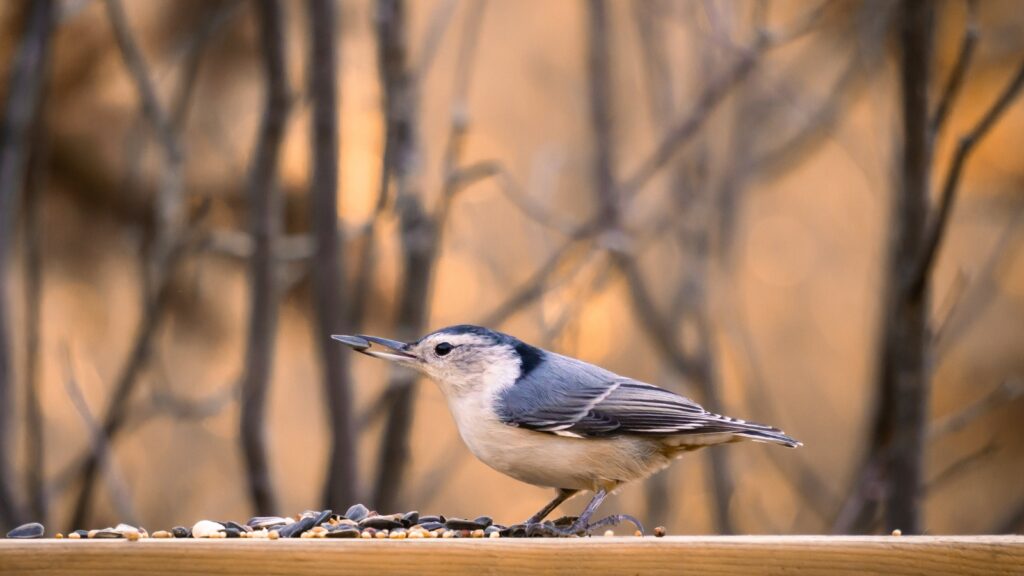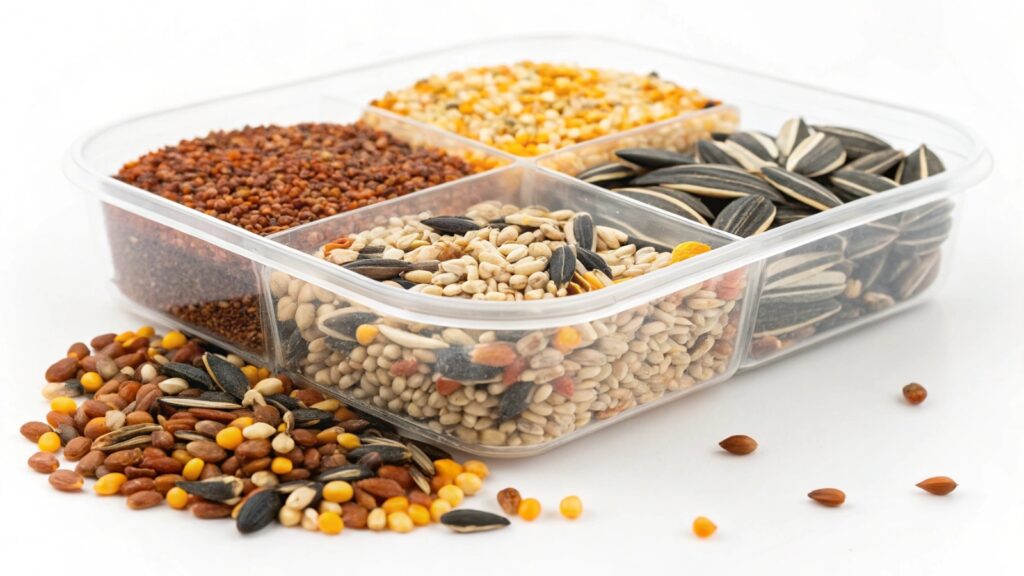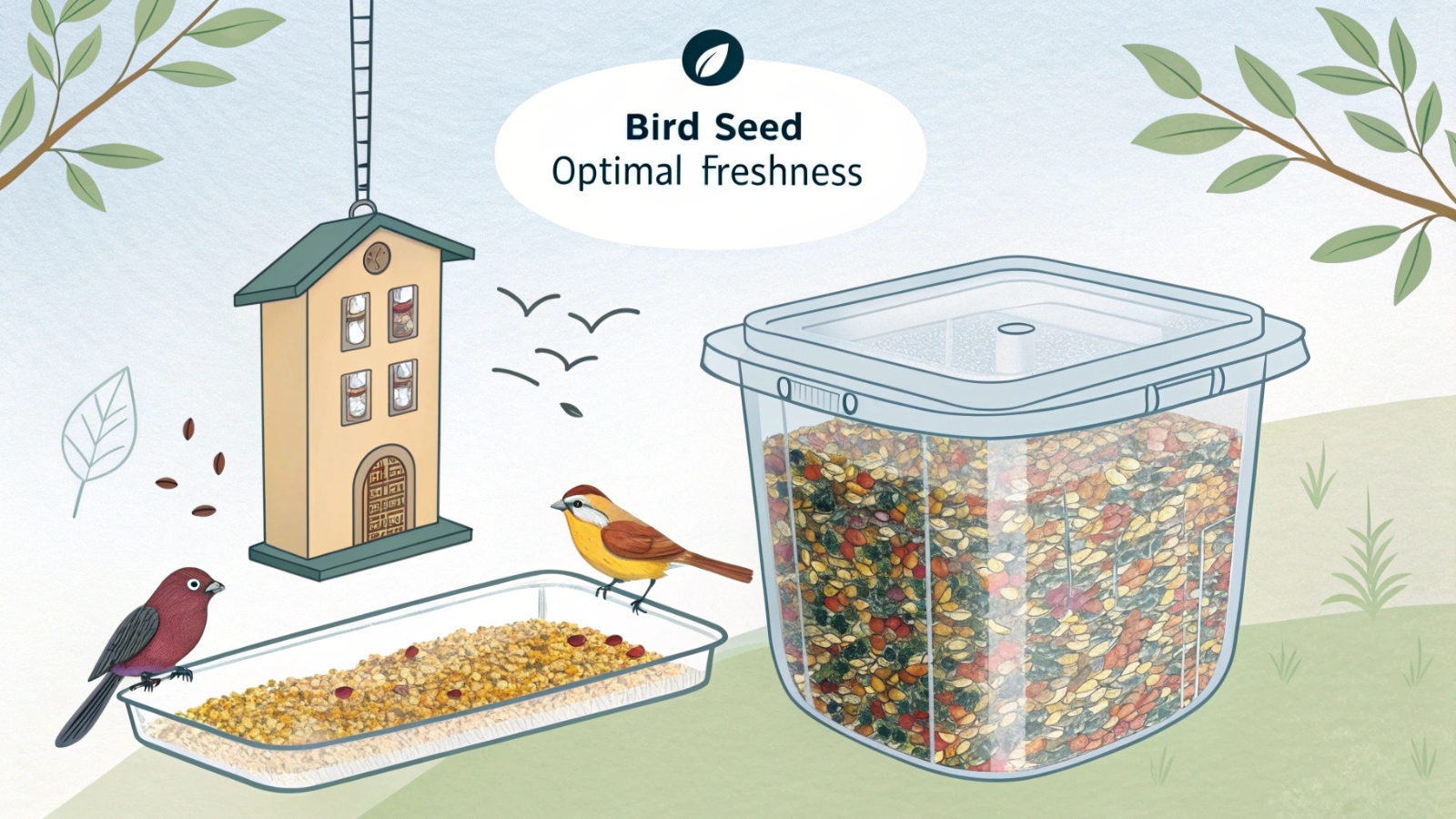Quick Answer: To store bird seed properly, use airtight metal or heavy-duty plastic containers, keep them in a cool, dry place between 50-70°F, and check regularly for moisture or mould. Different seeds have varying storage times – sunflower seeds last up to 6 months, while Nyjer seeds should be used within 3 months.
Bird lovers know that keeping seed fresh isn’t just about saving money – it’s about keeping our feathered friends healthy and happy. Whether you’re an experienced bird enthusiast or just starting with bird feeding, proper seed storage is crucial for maintaining seed quality and preventing waste.
In this blog post, we’ll explore everything you need to know about storing bird seed properly, from choosing the right containers to maintaining optimal storage conditions.
Key Takeaways: How to Store Bird Seed
Store bird seed in airtight containers at temperatures between 50-70°F (10-21°C) with 8-13% humidity. Check seeds regularly for freshness and rotate stock every 4-6 weeks in summer or 8-12 weeks in winter. Always keep seeds in a cool, dry place away from direct sunlight.

Why Fresh Bird Seed Matters
Fresh bird seed provides maximum nutritional value for your backyard birds. When seeds go bad, they can develop harmful mould, lose their nutritional content, and even make birds sick. Plus, fresh seed helps attract more birds to your feeders and reduces waste.
How to Tell If Bird Seed Is Fresh
Fresh bird seed should:
- Look bright and clean with no discoloration
- Feel dry and firm to the touch
- Have a natural, nutty smell
- Be free from clumps or moisture
- Show no signs of mould or pests.
Warning signs of spoiled seed include a musty smell, visible mould, clumped seeds, pest activity, or any signs of sprouting.
Perfect Storage Conditions: The Essential Factors
Temperature Control
Keep your bird seed between 50-70°F (10-21°C). This temperature range prevents mould growth while maintaining seed quality. Avoid areas with temperature swings, which can cause condensation.
Humidity Management
Keep humidity levels between 8-13% by:
- Using moisture-absorbing packets in storage containers
- Storing seeds away from damp areas
- Installing a small hygrometer to track humidity
- Checking containers weekly for condensation.
Choosing the Right Container
Best options include:
- Metal containers with tight-fitting lids
- Heavy-duty plastic containers with secure seals
- Glass containers for smaller amounts.
Avoid using thin plastic bags, paper bags, or containers with loose lids.
Finding the Perfect Storage Location
Store your bird seed in:
- A cool garage
- A dry basement
- An indoor pantry
- A weather-controlled garden shed.
Never store seed in direct sunlight, areas prone to flooding, hot attics, or exposed outdoor areas.
Step-by-Step Storage Guide
- Prepare your storage area:
- Clean the space thoroughly
- Check for moisture issues
- Ensure good ventilation
- Install pest deterrents if needed
- Choose and prepare your containers:
- Select airtight, pest-proof containers
- Clean containers thoroughly
- Make sure seals are intact
- Transfer and label your seed:
- Pour seed directly from original packaging
- Label with purchase and use-by dates
- Don’t mix old and new seed
- Maintain a regular schedule:
- Weekly checks for moisture and pests
- Monthly deep cleaning of containers
- Regular stock rotation
- Inventory updates.

Different Seeds, Different Storage Needs
Sunflower Seeds
- Store up to 6 months
- Most stable seed type
- Check monthly for freshness
- Keep cool and dry.
Nyjer Seeds
- Use within 3 months
- Most sensitive to spoilage
- Check weekly
- Store in smaller quantities.
Mixed Seeds
- Use within 4 months
- Check every two weeks
- Store seed types separately when possible
- Don’t mix different batches.
Smart Money-Saving Storage Strategies
- Buy in bulk during sales seasons
- Split large quantities with fellow bird enthusiasts
- Invest in quality containers – they pay for themselves
- Track your seed usage to avoid overbuying
- Use a rotation system to prevent waste.
Climate-Specific Storage Tips
For Humid Areas
- Add extra moisture absorbers to containers
- Check seed more frequently – at least weekly
- Consider using a dehumidifier in storage areas
- Rotate stock faster than in dry climates.
For Dry Climates
- Monitor closely for pest activity
- Use harder containers to prevent cracking
- Check seal integrity monthly
- Watch for seed cracking due to dryness.
Expert Monitoring Tips
The Sniff Test
- Check seed smell weekly
- Fresh seed has a mild, nutty aroma
- Discard immediately if you detect musty smells
- When in doubt, throw it out.
The Float Test
- Place a few seeds in water
- Fresh seeds should sink
- Bad seeds typically float
- Perform this test monthly.
Temperature Monitoring
- Use a basic thermometer in storage area
- Check readings weekly
- Record any major temperature changes
- Adjust storage location if needed.
Troubleshooting Common Problems
Dealing with Moisture
If you find moisture in your seed:
- Move seed to a dry container immediately
- Add moisture absorbers
- Increase ventilation
- Check container seals.
Handling Pest Problems
If you discover pests:
- Isolate affected containers
- Clean storage area thoroughly
- Use appropriate pest deterrents
- Replace contaminated seed.
Safety Guidelines
For Your Birds
- Never serve mouldy or wet seed
- Clean feeders at least once a month
- Discard any wet seed immediately
- Watch for signs of sick birds at feeders.
For You
- Wear gloves when handling seed
- Store bird seed away from human food
- Use masks when cleaning dusty containers
- Always wash hands after handling seed.
Final Thoughts
Proper bird seed storage takes some effort, but it’s worth it to keep your backyard birds healthy and well-fed. Remember to check your seed regularly, maintain proper storage conditions, and replace any seed that shows signs of spoilage. Your feathered friends will thank you with their continued visits to your feeders!
Frequently Asked Questions (FAQ: How to Store Bird Seed)
Q: How long can I store bird seed?
A: Storage time varies by seed type. Sunflower seeds last up to 6 months, Nyjer seeds should be used within 3 months, and mixed seeds typically last 4 months when stored properly.
Q: What’s the best container for storing bird seed?
A: Metal containers with tight-fitting lids or heavy-duty plastic containers with secure seals are best. These materials protect against moisture and pests while maintaining freshness.
Q: How can I tell if bird seed has gone bad?
A: Check for a musty smell, visible mould, clumping, moisture, or signs of pest activity. Fresh seed should smell nutty and look clean and dry.
Q: Should I store different types of bird seed separately?
A: Yes, storing different seed types separately is best. This prevents cross-contamination and allows you to monitor each seed type’s freshness individually.
Q: Can I store bird seed outside?
A: No, storing birdseed outside isn’t recommended. Indoor storage protects against weather, temperature changes, and pests. Choose a cool, dry indoor location instead.
If you found this guide helpful, please share it with other bird enthusiasts who might benefit from these storage tips. Have you tried any of these storage methods? We’d love to hear about your experiences in the comments below!
Citation:
Cornell Lab of Ornithology. (2009, April 20). Feeding birds: A quick guide to seed types. All About Birds. Retrieved January 18, 2025, from https://www.allaboutbirds.org/news/types-of-bird-seed-a-quick-guide/
